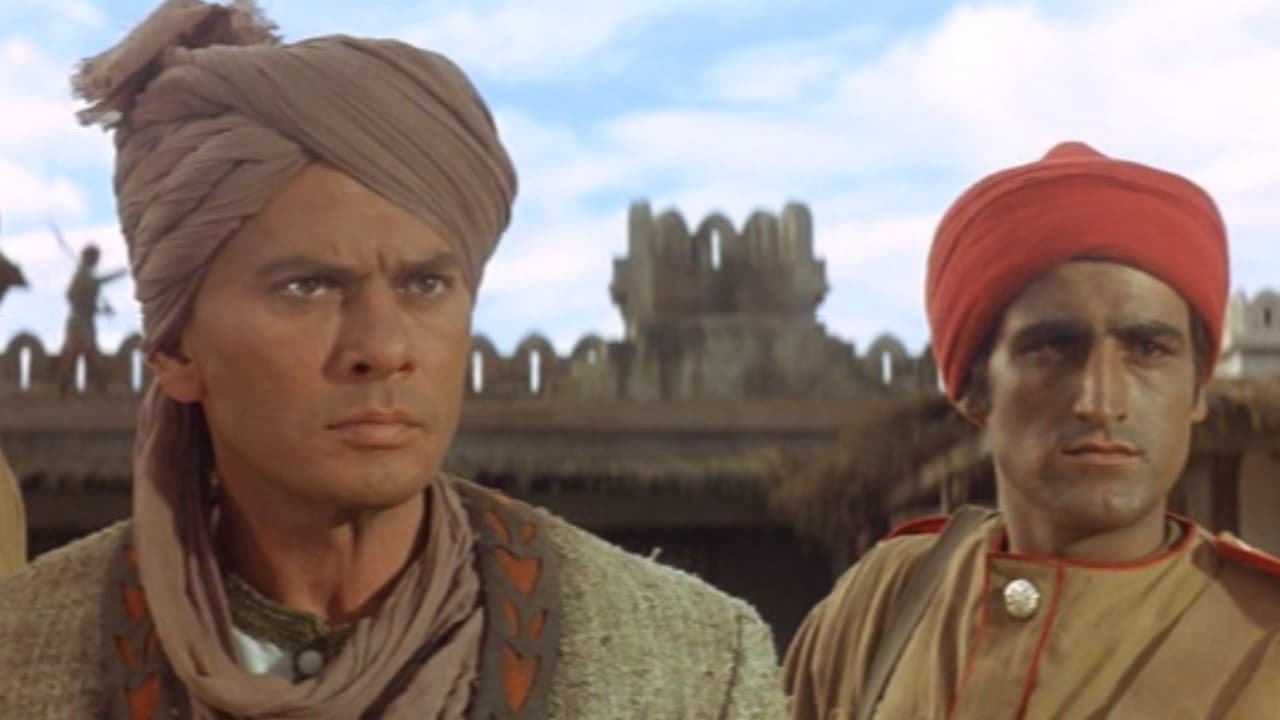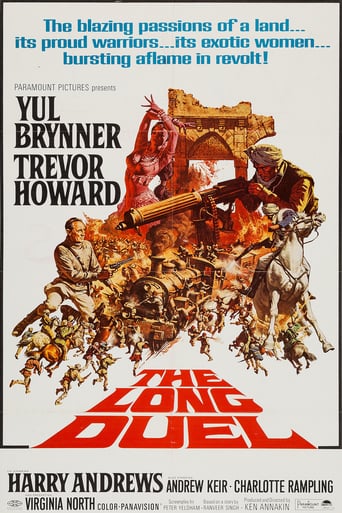

In the dying days of the Raj, a tribal leader struggles for freedom against the Imperial Indian Police forces. The man charged with the task of apprehending the rebels sees things differently from his superiors, who wish to use the blunt instrument of force alone to suppress the insurgents.Ken Annakin knew how to make a good movie and here he had the undoubted talents of Yul Brynner, Trevor Howard, Harry Andrews, Charlotte Rampling, and Edward Fox to hand, amongst others. Behind the camera Oscar-winner Jack Hildyard was DoP.Given the cast and crew, one would expect a movie that looks great and holds your attention. Those with short attention spans may disagree, but I think they did that, and (in a recently broadcast version which appears to have been restored) this movie still looks stunning. The problem perhaps is that the script is not quite up to the same standard as the rest of the film, or that it superficially resembles something else.Superintendent Harry Andrews is well-cast as the blunt instrument of Imperial Power, leading a force that look more like regular soldiers than policemen. Yul Brynner does a competent job too.However Trevor Howard looks somewhat out of place, and unrealistic as love interest for Charlotte Rampling. But to my mind, both these things are quite deliberate; Rampling's character is attracted to Howard's personality, which contrasts with that of her father and (presumably) the others in the police force; of those that inhabit her insular world, she is drawn to him because of this, and despite the obvious age gap.Howard's character looks out of place and it is meant to; not everyone could the job that is asked of him. His humanity and compassion underlie the dilemma he faces, the conflict within, between his idealism and his sense of duty. I thought this a very good performance from Howard; he spends much of the film looking both world-weary and internally riven.Some aspects of this film are well-founded in fact; very many administrators in the days of the Raj loved the country and the people, yet felt deeply conflicted in the course of their duties. For example Eric Blair (better known as George Orwell) served in the Imperial Indian Police force in the 1920s, reaching the rank of Assistant District Superintendent in Burma.He said that, on the one hand, seeing "the dirty work of Empire at close quarters" (which included being hated by much of the local populace) had affected his outlook on almost every aspect of his life; on the other hand he also wrote that "I loved Burma and the Burman and have no regrets that I spent the best years of my life in the Burma police.".This film is not meant to have a happy ending, any more than 'Bridge on the River Kwai' or 'Lawrence of Arabia' (both also psychological studies of the lead character) are meant to. Those that might naively suppose that a younger man could have played Howard's role and then swanned off into the sunset with Rampling or something are completely missing the point. In what may be an allegory of Indian independence itself, no-one involved comes out of it very well; all that remains is a little hope for the future, as symbolised by Sultan's son.
... View MoreI saw this as a boy on its first release. It was supported by Eric Sykes' much shorter, mainly silent comedy, THE PLANK, still recalled today while DUEL soon vanished into obscurity. I enjoyed it at the time, but then all the scenery and action in colour on the big screen seemed marvellous in those days of black and white TV.This is similar to several films of a decade earlier, notably Terence Young's ZARAK (1956) which had stony-faced Victor Mature playing the titular rebel, though Yul Brynner and his gang of mostly 'browned-up' British character actors generally do a more efficient job than their counterparts in the former production. DUEL is also set in a later period, the 1920s, reflecting a time in which the futility of British rule was becoming more apparent, but there is little that is overtly political here. Instead we get the collision of attitudes between hard-line authoritarian Harry Andrews and the liberal Trevor Howard, a familiar theme in everything from prison dramas to westerns. Both actors give their usual authoritative performances, all the more impressive given some of the uninspired writing. I always like Charlotte Rampling, but her appearance seems too modern for the time. There are lots of fights, ambushes and shoot-ups and it works on the level of a run-of-the-mill western, but who on earth came up with the idea of the cheesy pop song for the closing credits?
... View MoreThat's something you don't see every day . A western that doesn't take place in the United States , has no native American characters or white guys with American accents but THE LONG DUEL is undoubtedly a western that has been relocated from the American plains to British run India . Hey even most of the protagonists are called Indians and that's no coincidence .THE LONG DUEL is by no means a terrible wretched movie but it is rather mediocre . The story as I mentioned is something that has appeared countless times where an injun war party has gone on the loose and it's up to a sympathetic calvary officer to negotiate with the dove and kill the hawk only this time the Indians are Hindus and the calvary officer is a fine upstanding spiffing chap The production values are hardly outstanding with some very obvious studio exteriors and back screen projection and no doubt the PC fascists will have a field day when they see that most of the Asians aren't actually Asian at all but a bunch of British actors in dark make up . The film does contain some gun battles and fist fights so it's not exactly a total bore and one scene with a fugitive hiding down a well does contain some suspense . Make up your own mind as to the movies merits
... View MoreThe adventure yarn as it used to be a long long time ago.There's the proud rebel "Sultan" (Brynner) who's fighting against the English (represented by a loyal brave generous officer-Howard- and a villain one -Andrews-).And Andrews looks the part ! As the case often happens,to hear the scenarists ,if a father is wicked,then the daughter is adorable:she's played by a decorative Charlotte Rampling ,who tells Howard -whom she's in love with of course-:"one day ,Sultan and you ,you will meet".Main interest remains the splendor of the landscapes.
... View More